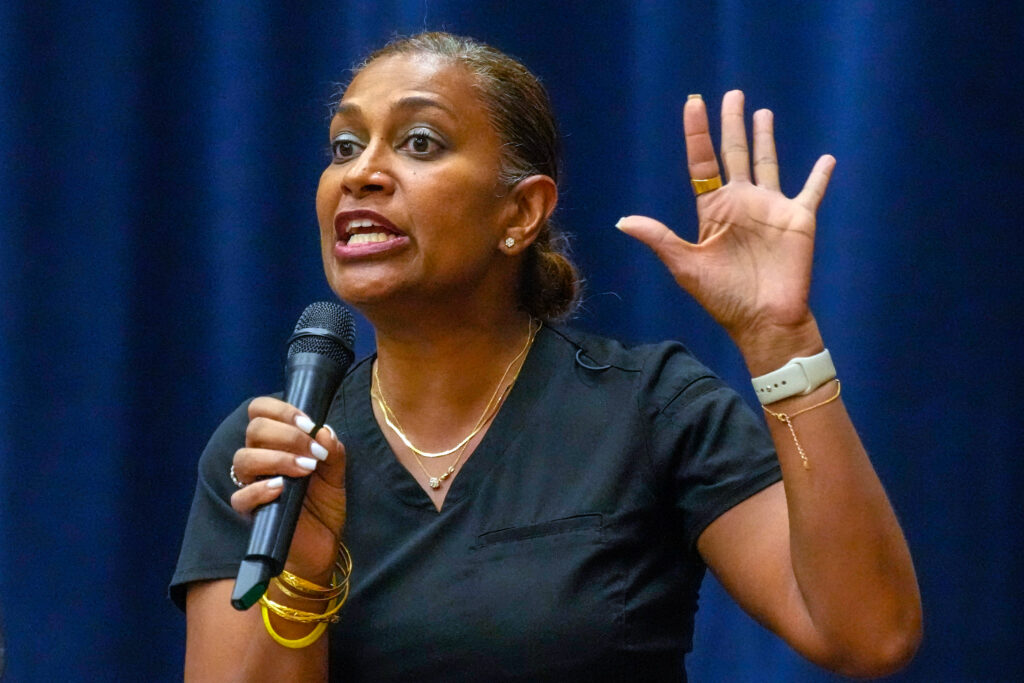A recent report by a Houston City Council member critiques the method of “advanced” or “chemical recycling” of plastics known as pyrolysis, which city officials support in collaboration with ExxonMobil.
The report from Councilmember Letitia Plummer, elected citywide, claims this technology, integrated by ExxonMobil into its Baytown petrochemical complex, promotes fossil fuel extraction and generates hazardous emissions.
The report aligns with other findings and a California lawsuit indicating that only a small fraction of plastics processed through pyrolysis becomes reusable materials like propylene and ethylene, while most transform into chemical byproducts burned as fuel, thereby increasing greenhouse gas emissions.
Pyrolysis, a chemical processing method promoted by the chemical industry as a solution to the plastic waste problem, involves high heat and pressure in an oxygen-free environment to produce oil and gases. Environmental groups liken it to incineration, and the U.S. Environmental Protection Agency does not classify converting plastic waste to fuel as recycling.
Plummer urges the city to rethink its support of pyrolysis and instead focus on reducing single-use plastics and enhancing traditional recycling technologies.
This report is the first detailed critique from a City Council member concerning Houston’s plastic recycling program since former mayor Sylvester Turner joined the Houston Recycling Collaboration in January 2022.
Partnerships in the collaboration aimed to increase Houston’s plastic recycling from less than 10 percent to 90 percent, positioning it as a national model. However, critics, including California Attorney General Rob Bonta, have labeled chemical recycling as deceptive.
Jennifer Hadayia, executive director of the environmental nonprofit Air Alliance Houston, praised the councilmember’s report.
“We’re thrilled about this initiative—the first significant move from the City to scrutinize chemical recycling and the partnership,” she said in an email.
Air Alliance Houston has reached out to several council members, including Plummer, to discuss concerns. Hadayia noted that many were unaware of the 2022 memorandum establishing the recycling collaboration, involving Exxon, LyondellBasell, and Cyclyx, a company partly owned by these petrochemical giants.
As the report circulates among city officials and Mayor John Whitmire’s administration, some might be surprised by the city’s support for chemical recycling. The city’s contribution includes recycling drop-off locations throughout Houston.
The Houston mayor’s office did not comment on Plummer’s report. Mark Wilfalk, director of the Houston Solid Waste Management Department, stated, “While we agree with many recommendations in the report, such as reducing plastics production and enhancing mechanical recycling, we also wish to explore alternative concepts for repurposing solid waste typically destined for landfills.”
Exxon spokeswoman Lauren Kight defended chemical recycling in an email, calling it “a proven technology to enhance recycling rates and support a more circular economy.”
She stated that many plastic products cannot be recycled traditionally: “Advanced recycling broadens the range of products for collection, sorting, and recycling. We’re open to collaborating with governments on policies that curb plastic waste.”
Inside Climate News investigated the recycling collaboration, the execution of its recycling efforts, and Exxon’s new chemical recycling facility after volunteers discovered that collected plastic waste was not being recycled but rather accumulating at a private waste business.
A joint reporting project by Inside Climate News and CBS News revealed that the waste continued to accumulate, despite failing fire safety inspections. The company lacked the necessary permits for handling “hazardous materials.”
Munira Bangee, Plummer’s chief of staff, mentioned that the councilwoman was aware of the report and had engaged with Air Alliance Houston.
“We are monitoring the situation,” Bangee said. “This report is for the administration to understand Councilwoman Plummer’s concerns about all the plastic waste.”
Plummer is interested in learning more about the recycling collaboration and its MOU. “Councilwoman Plummer requests a meeting with the director of solid waste to better understand this MOU and the city’s recycling efforts,” Bangee added.
Plummer supports mechanical recycling, which typically involves sorting, cleaning, shredding, and molding waste into new products. However, this process is limited as plastics can only be recycled a finite number of times and may produce microplastic pollution.
Exxon’s recycling practices in Baytown have attracted the attention of the California attorney general. In September, Bonta sued Exxon for decades of alleged deception over recycling claims.
The lawsuit argues that Exxon’s marketing materials falsely suggest that all plastic waste can be recycled through chemical recycling, which allegedly has a yield of just 8 percent.
Exxon criticized California’s recycling system failures and praised advanced recycling: “California officials have long known their recycling system is ineffective. They failed to act and now blame others. Advanced recycling works, and we’ve processed over 60 million pounds of plastic waste into usable materials.”
Exxon aims to process 1 billion pounds by 2027, which the lawsuit describes as “one percent or less” of its production capacity.
Plummer’s report raises significant concerns about chemical recycling, noting:
- Pyrolysis supports fossil fuel consumption, contrary to claims of promoting a circular plastic economy. More plastic processed at Baytown is turned into fuel than new plastic.
- Reducing plastic waste requires limiting its production. Houston should reduce plastic consumption, especially single-use items.
- Expanding mechanical recycling and holding companies accountable for pollution from chemical recycling is crucial.
- Protecting marginalized communities near recycling plants from pollution and involving them in policy decisions is necessary.
Hadayia hopes the City Council will examine the city’s recycling collaboration marketing, which may give a false impression of recycling outcomes.
“We’ve been advocating on this issue for over a year,” Hadayia said. “We’re pleased to see this report circulating among council members.”
Original Story at insideclimatenews.org
